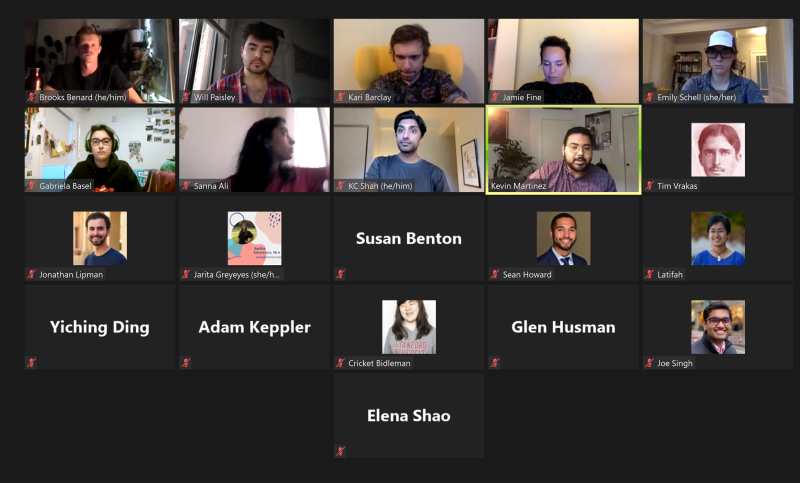The Graduate Student Council (GSC) unanimously elected KC Shah J.D. ’22 and fourth-year Ph.D. communications student Sanna Ali as co-chairs for the coming year at its Wednesday meeting. They’ll take on the responsibility of representing the graduate student community in regular meetings with top administrators and assume a leading role in guiding the direction of the council’s advocacy each year, with plans to focus on strengthening equity and representation for marginalized graduate students.
The council also considered a resolution that would house Carta as a joint service project of the Associated Students of Stanford University (ASSU).
The induction ceremony, where 13 new and returning councilors were sworn in, came approximately one week after the results of this year’s general election were announced.
Though there was some uncertainty surrounding whether the five write-in candidates elected would come to the meeting, only two elected candidates were absent for the swearing-in: Thomas Dougherty, a second-year civil engineering Ph.D. student who was written in, and Camilo Ruiz, who dropped out of the election but did not withdraw his candidacy in time to be taken off the ballot.
Incoming ASSU vice president Cricket Bidleman ’21 M.A. ’22 will likely need to follow up with the missing elected councilors and swear them in privately, according to Kari Barclay, the outgoing GSC co-chair and fifth-year theater and performance studies Ph.D. student, though it is uncertain whether the candidates will accept their posts.
Newly elected co-chairs Ali and Shah are returning councilors in their second year on the GSC. Though Shah nominated newly elected councilor and fourth-year modern thought and literature Ph.D. student Jamie Fine for the position, Fine said that she thought Shah should serve as co-chair due to his experience on the council. No one else ran for the position.
Shah has a long list of priorities for the GSC to tackle over the coming year and hopes he and the council will be able to make progress on several key goals. After over a year of instability and uncertainty within the graduate community, the reopening of the University has the potential to be a “hard reset,” a time when tangible progress on how graduate students are treated by the University is attainable, he said.
Among those objectives is increasing inclusion in the council’s efforts: “I want to make students who are in underrepresented groups, including first generation students and communities of color, feel like the GSC is working to hold the University’s feet to the fire about anti-racism goals,” Shah said.
He added that he plans to work to bridge the decentralization across University departments and push to make graduate students a more integral part of campus life.
This is in line with his past efforts on the council: In the past year, he sat on University reopening committees over the summer, represented graduate students on the Housing Advisory Committee and brought students together through safe social events such as the GSC-organized Thanksgiving celebration. Shah has also played an integral role in redesigning the ASSU Constitution and advising the University on the Campus Compact.
Ali had to leave the meeting early, but in the past year, she’s used her time on the GSC to give a platform for graduate student workers, including community associates and teaching assistants, advocating for better working and living conditions. Ali has been especially active in making administrators aware of the need for social support and safe gatherings in order to support graduate student mental health.
Councilors also got one step closer to voting on a resolution to make Carta an ASSU service organization. Carta, a data-driven course evaluation platform, was previously housed under the Stanford Pathways Lab, but the lab has finished collecting most of the data it wanted from the platform, according to Glen Husman ’23, a student member of the Carta team.
There was considerable concern among the student body last fall about the fate of Carta: Students working on Carta claimed that they were “at risk of being shut down” due to the data that the platform relies on potentially becoming inaccessible. After a petition backing the site garnered hundreds of signatures, Stanford committed to supporting the platform and opened the door for the student project to potentially become part of the ASSU.
As an ASSU service organization, Carta would receive funding and be able to operate as a semi-autonomous student-run agency.
Husman added that the resolution would help clearly define the organizational status of Carta and formalize relations between the platform and the University: “We’ve been organizationally ambiguous, and this gives us a route to solidify our importance as wanted by the student body, as well as a route to get funding if we need it,” Husman said.
The Undergraduate Senate passed the resolution on May 6, and the GSC will vote on it next week. If passed as a joint resolution, the next step for Carta and the ASSU will be to articulate the details of the partnership in a joint Memorandum of Understanding.
